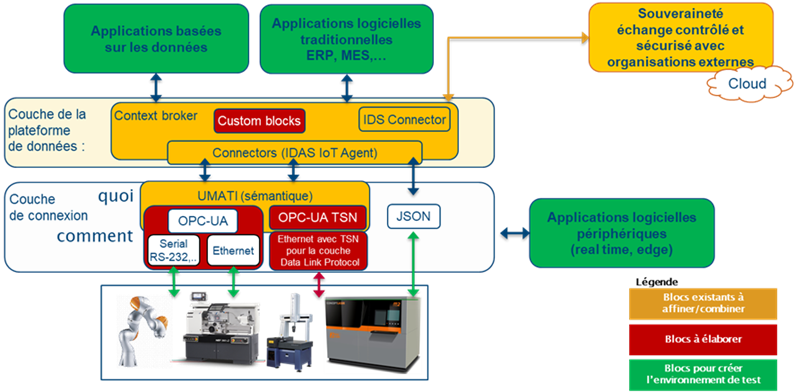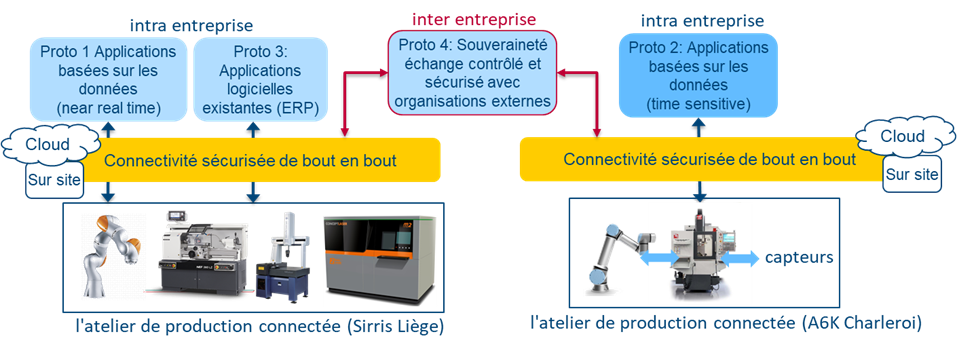PROCOPIDO
PROduction COnnectée PIlotée par les Données (Data driven connected production)

Objective of the project
The PROCOPIDO project aims to make the manufacturing SME more easily and cheaply to initiate new applications driven by data acquired in (near) real time.
Context
The abandonment of mass production in favour of small series of complex tailor-made products with high added value and short lead times, leads to an increased complexity of production in Walloon manufacturing companies. As a result, productivity is under pressure. In addition, under the impulse of customers or suppliers, the company must engage in a plan to transform its business model (new products & services).
To get by, the company needs to become more agile and ensure that the right information gets to the right person at the right time, allowing for decentralized decision-making and reorganization of the value chain. However, most Walloon production workshops have software applications (ERP, MES, …) that send manufacturing orders in the workshop in a one-way communication mode. It’s definitely not enough anymore. Today, companies want to be able to easily connect their production systems in a bidirectional way so they can extract or inject data and allow everyone to access it. They also want to be able to exchange data securely with external partners and preserve their sovereignty. In some cases, real-time communication is desired.
It is simple to solve when all the machines are new and from the same manufacturer, but it is not yet solved and much more complex when the company is strategically positioned with a fleet of heterogeneous machines (brands, types, seniority, each having its own connection possibilities and its own vocabulary of parameters) and have various disconnected data sources (sensors, ERP, MES, QMS, CFAO, Excel, …).

Connectivity solution concepts: today vs tomorrow
Aim
The PROCOPIDO project aims to develop a flexible and extensible modular architecture concept that can be implemented gradually (from the simplest to the most complicated). The expected result is the provision of open, modular and combinable solutions that are based on international I4.0 standards to ensure timely connectivity (near) real end-to-end security and technical and semantic interoperability in a heterogeneous hardware and software space typical of manufacturing companies.

Approach
With representative use cases from manufacturing SMEs and machine manufacturers as the starting point, the connectivity solutions developed are implemented on 4 representative pilot cases with a dual objective. On the one hand, provide proof of concept and on the other hand, provide a tool for raising awareness and learning about technical possibilities for all stakeholders in the value chain.
The project will end with the development of workshop concepts and training pathways to facilitate the accelerated acquisition of knowledge by SMEs and allow everyone to experiment with these connectivity solutions.

This project was selected as part of the Win4Collective 2022 call (No. 2210079), which aims to strengthen the expertise and know-how of the Approved Research Centres (CRA) in key areas for the future of Wallonia.

Contribution de Multitel
Multitel is responsible for the technological development of Real-Time Synchronization and Controlled Exchange – Secure – Sovereignty tasks between external organizations. However, it will be closely linked to the steering committee, which will propose its usual configurations of machines to analyse the connectivity between them. Multitel is responsible for certain product prototypes.
Applications
All stakeholders in the value chain are concerned with the results of this project, whether they are machine manufacturers, ERP/MES suppliers, intelligent component manufacturers, developers of digital platforms and data-based applications and of course manufacturing companies. All these actors are represented in the project steering group. They provide data for the specification of typical applications and provide representative use cases. They ensure that the results of the project make sense in relation to the challenges they face in breaking down data silos. The members of the steering group have priority in the acquisition of knowledge.
Coordinator
Partner
- Multitel
